Educational Leadership: Shared Learning Philosophy Analysis
VerifiedAdded on 2023/06/05
|7
|1645
|340
Essay
AI Summary
This essay explores the philosophy of shared learning within the context of educational leadership. It defines educational leadership as a collaborative process that unites teachers, students, and parents to improve the educational system. The author advocates for shared learning, emphasizing its ability to maximize knowledge acquisition and support both teachers and students. The essay details practical applications of shared learning, such as group projects, teacher collaborations, and parent-teacher meetings, and also discusses the philosophy's alignment with Vygotsky's zone of proximal development, democratic education, Bandura's social learning theory, and Piaget's psychosocial theory. The author concludes that quality educational leadership facilitates collaboration and shared learning to optimize student outcomes and maintain high educational standards. The essay references key literature to support its arguments and provide context for the discussion.
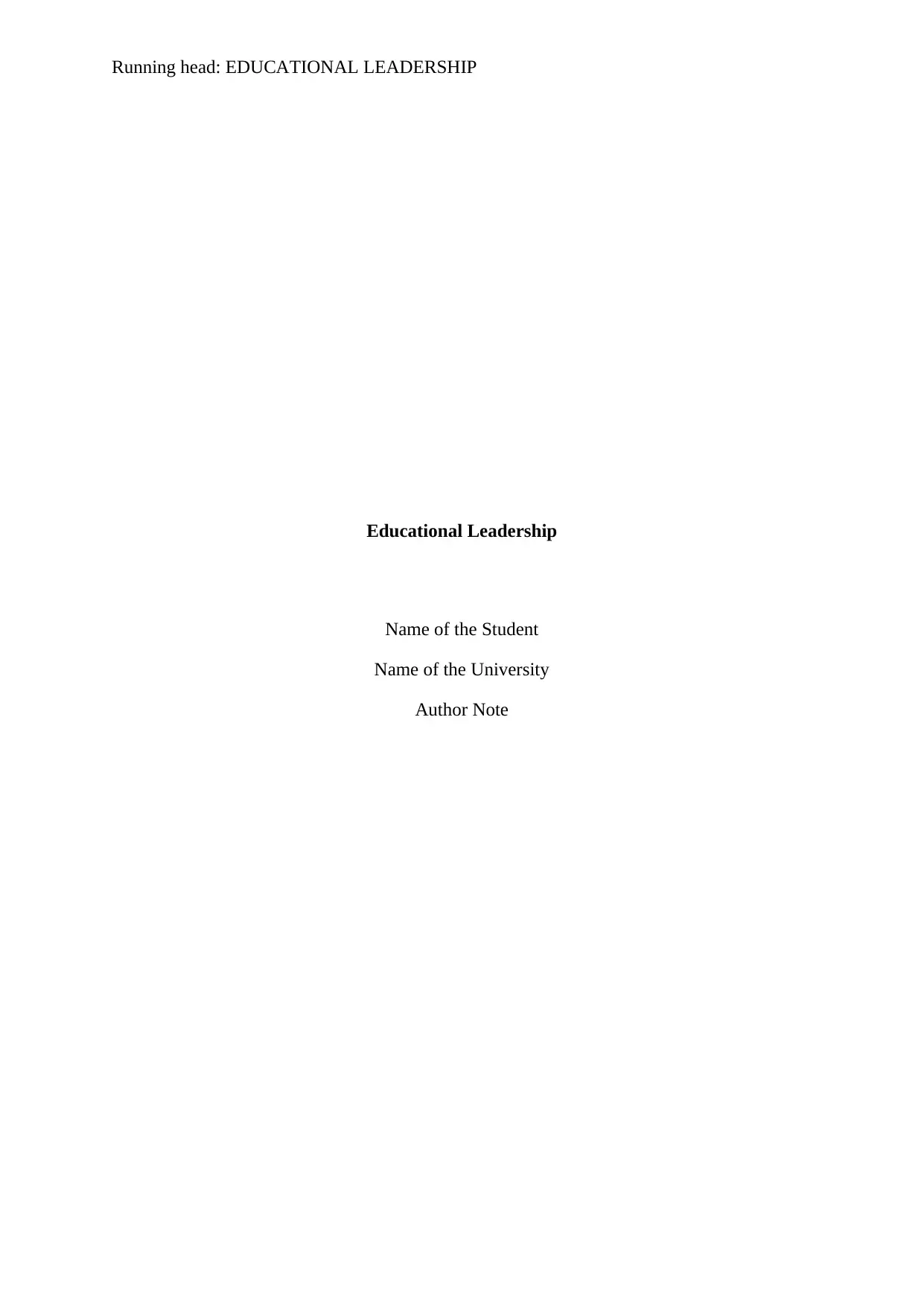
Running head: EDUCATIONAL LEADERSHIP
Educational Leadership
Name of the Student
Name of the University
Author Note
Educational Leadership
Name of the Student
Name of the University
Author Note
Paraphrase This Document
Need a fresh take? Get an instant paraphrase of this document with our AI Paraphraser
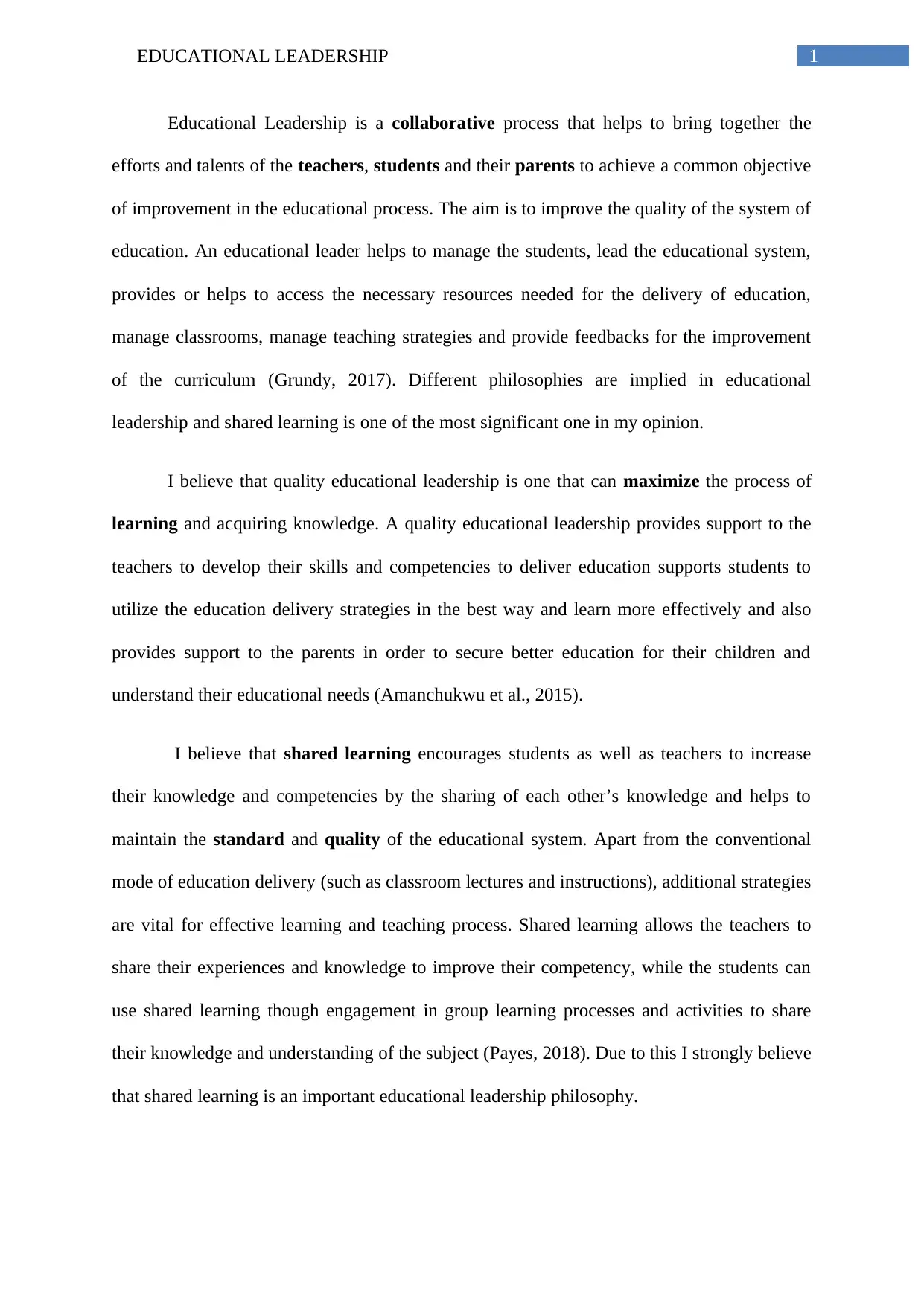
1EDUCATIONAL LEADERSHIP
Educational Leadership is a collaborative process that helps to bring together the
efforts and talents of the teachers, students and their parents to achieve a common objective
of improvement in the educational process. The aim is to improve the quality of the system of
education. An educational leader helps to manage the students, lead the educational system,
provides or helps to access the necessary resources needed for the delivery of education,
manage classrooms, manage teaching strategies and provide feedbacks for the improvement
of the curriculum (Grundy, 2017). Different philosophies are implied in educational
leadership and shared learning is one of the most significant one in my opinion.
I believe that quality educational leadership is one that can maximize the process of
learning and acquiring knowledge. A quality educational leadership provides support to the
teachers to develop their skills and competencies to deliver education supports students to
utilize the education delivery strategies in the best way and learn more effectively and also
provides support to the parents in order to secure better education for their children and
understand their educational needs (Amanchukwu et al., 2015).
I believe that shared learning encourages students as well as teachers to increase
their knowledge and competencies by the sharing of each other’s knowledge and helps to
maintain the standard and quality of the educational system. Apart from the conventional
mode of education delivery (such as classroom lectures and instructions), additional strategies
are vital for effective learning and teaching process. Shared learning allows the teachers to
share their experiences and knowledge to improve their competency, while the students can
use shared learning though engagement in group learning processes and activities to share
their knowledge and understanding of the subject (Payes, 2018). Due to this I strongly believe
that shared learning is an important educational leadership philosophy.
Educational Leadership is a collaborative process that helps to bring together the
efforts and talents of the teachers, students and their parents to achieve a common objective
of improvement in the educational process. The aim is to improve the quality of the system of
education. An educational leader helps to manage the students, lead the educational system,
provides or helps to access the necessary resources needed for the delivery of education,
manage classrooms, manage teaching strategies and provide feedbacks for the improvement
of the curriculum (Grundy, 2017). Different philosophies are implied in educational
leadership and shared learning is one of the most significant one in my opinion.
I believe that quality educational leadership is one that can maximize the process of
learning and acquiring knowledge. A quality educational leadership provides support to the
teachers to develop their skills and competencies to deliver education supports students to
utilize the education delivery strategies in the best way and learn more effectively and also
provides support to the parents in order to secure better education for their children and
understand their educational needs (Amanchukwu et al., 2015).
I believe that shared learning encourages students as well as teachers to increase
their knowledge and competencies by the sharing of each other’s knowledge and helps to
maintain the standard and quality of the educational system. Apart from the conventional
mode of education delivery (such as classroom lectures and instructions), additional strategies
are vital for effective learning and teaching process. Shared learning allows the teachers to
share their experiences and knowledge to improve their competency, while the students can
use shared learning though engagement in group learning processes and activities to share
their knowledge and understanding of the subject (Payes, 2018). Due to this I strongly believe
that shared learning is an important educational leadership philosophy.
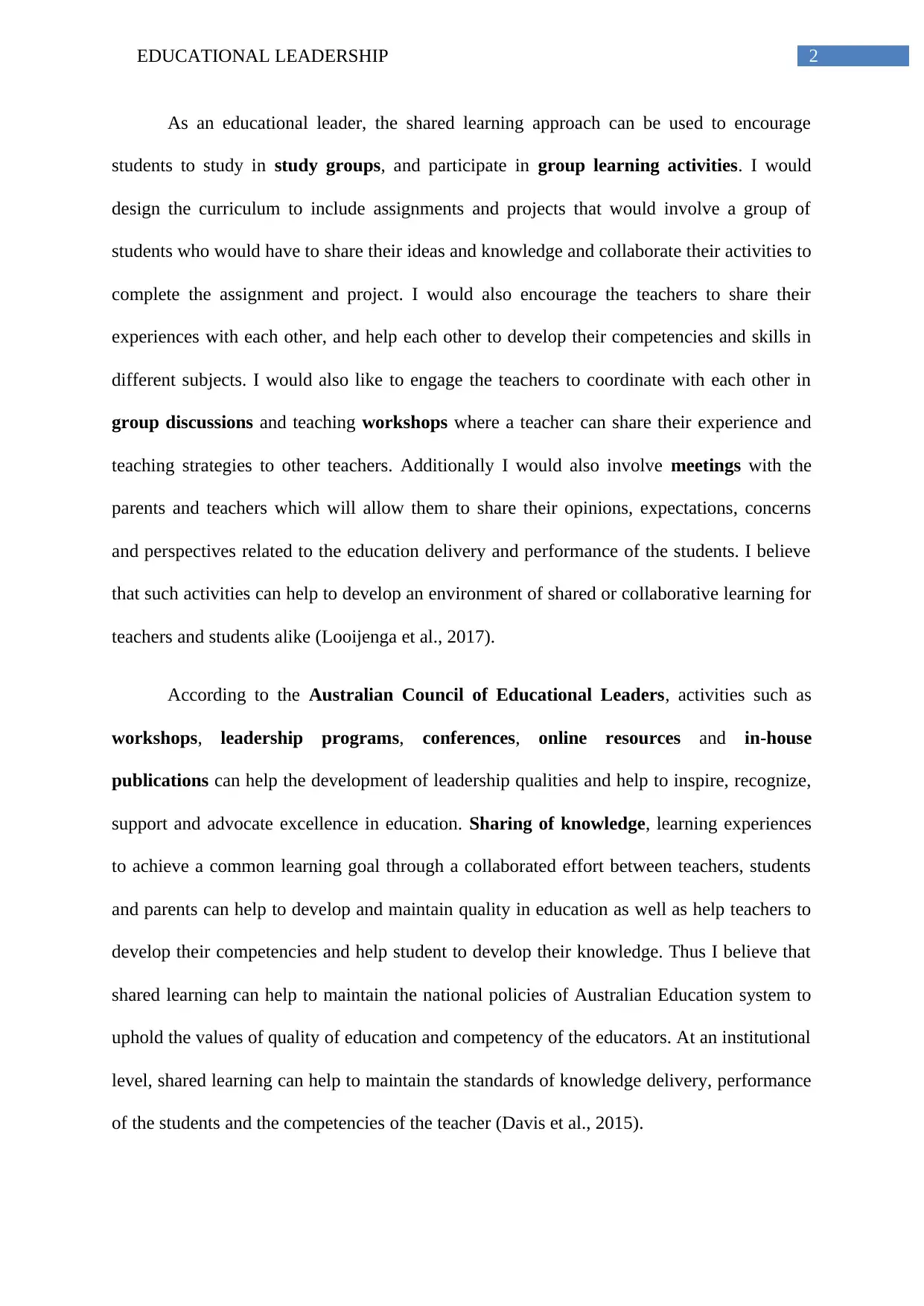
2EDUCATIONAL LEADERSHIP
As an educational leader, the shared learning approach can be used to encourage
students to study in study groups, and participate in group learning activities. I would
design the curriculum to include assignments and projects that would involve a group of
students who would have to share their ideas and knowledge and collaborate their activities to
complete the assignment and project. I would also encourage the teachers to share their
experiences with each other, and help each other to develop their competencies and skills in
different subjects. I would also like to engage the teachers to coordinate with each other in
group discussions and teaching workshops where a teacher can share their experience and
teaching strategies to other teachers. Additionally I would also involve meetings with the
parents and teachers which will allow them to share their opinions, expectations, concerns
and perspectives related to the education delivery and performance of the students. I believe
that such activities can help to develop an environment of shared or collaborative learning for
teachers and students alike (Looijenga et al., 2017).
According to the Australian Council of Educational Leaders, activities such as
workshops, leadership programs, conferences, online resources and in-house
publications can help the development of leadership qualities and help to inspire, recognize,
support and advocate excellence in education. Sharing of knowledge, learning experiences
to achieve a common learning goal through a collaborated effort between teachers, students
and parents can help to develop and maintain quality in education as well as help teachers to
develop their competencies and help student to develop their knowledge. Thus I believe that
shared learning can help to maintain the national policies of Australian Education system to
uphold the values of quality of education and competency of the educators. At an institutional
level, shared learning can help to maintain the standards of knowledge delivery, performance
of the students and the competencies of the teacher (Davis et al., 2015).
As an educational leader, the shared learning approach can be used to encourage
students to study in study groups, and participate in group learning activities. I would
design the curriculum to include assignments and projects that would involve a group of
students who would have to share their ideas and knowledge and collaborate their activities to
complete the assignment and project. I would also encourage the teachers to share their
experiences with each other, and help each other to develop their competencies and skills in
different subjects. I would also like to engage the teachers to coordinate with each other in
group discussions and teaching workshops where a teacher can share their experience and
teaching strategies to other teachers. Additionally I would also involve meetings with the
parents and teachers which will allow them to share their opinions, expectations, concerns
and perspectives related to the education delivery and performance of the students. I believe
that such activities can help to develop an environment of shared or collaborative learning for
teachers and students alike (Looijenga et al., 2017).
According to the Australian Council of Educational Leaders, activities such as
workshops, leadership programs, conferences, online resources and in-house
publications can help the development of leadership qualities and help to inspire, recognize,
support and advocate excellence in education. Sharing of knowledge, learning experiences
to achieve a common learning goal through a collaborated effort between teachers, students
and parents can help to develop and maintain quality in education as well as help teachers to
develop their competencies and help student to develop their knowledge. Thus I believe that
shared learning can help to maintain the national policies of Australian Education system to
uphold the values of quality of education and competency of the educators. At an institutional
level, shared learning can help to maintain the standards of knowledge delivery, performance
of the students and the competencies of the teacher (Davis et al., 2015).
⊘ This is a preview!⊘
Do you want full access?
Subscribe today to unlock all pages.

Trusted by 1+ million students worldwide
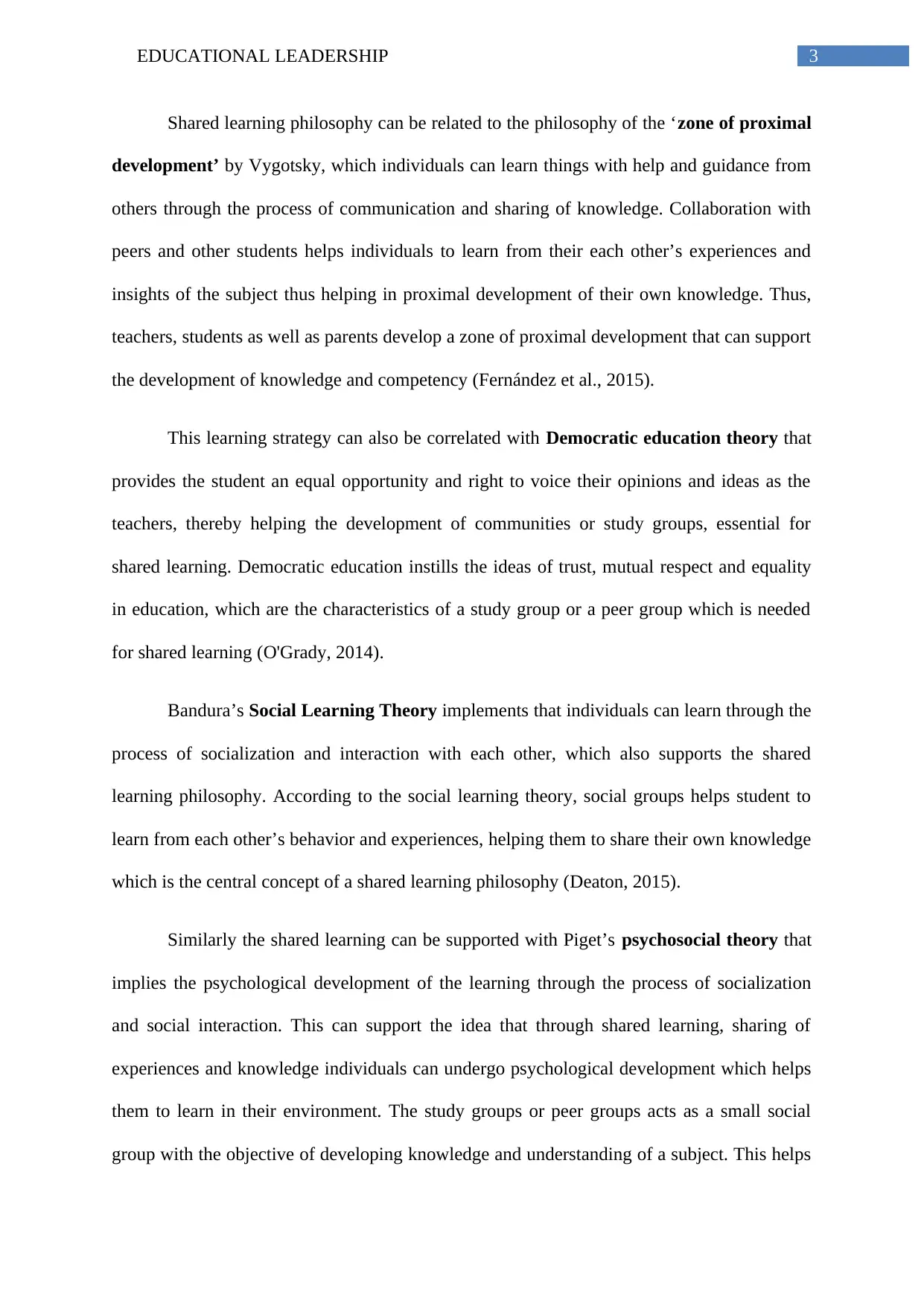
3EDUCATIONAL LEADERSHIP
Shared learning philosophy can be related to the philosophy of the ‘zone of proximal
development’ by Vygotsky, which individuals can learn things with help and guidance from
others through the process of communication and sharing of knowledge. Collaboration with
peers and other students helps individuals to learn from their each other’s experiences and
insights of the subject thus helping in proximal development of their own knowledge. Thus,
teachers, students as well as parents develop a zone of proximal development that can support
the development of knowledge and competency (Fernández et al., 2015).
This learning strategy can also be correlated with Democratic education theory that
provides the student an equal opportunity and right to voice their opinions and ideas as the
teachers, thereby helping the development of communities or study groups, essential for
shared learning. Democratic education instills the ideas of trust, mutual respect and equality
in education, which are the characteristics of a study group or a peer group which is needed
for shared learning (O'Grady, 2014).
Bandura’s Social Learning Theory implements that individuals can learn through the
process of socialization and interaction with each other, which also supports the shared
learning philosophy. According to the social learning theory, social groups helps student to
learn from each other’s behavior and experiences, helping them to share their own knowledge
which is the central concept of a shared learning philosophy (Deaton, 2015).
Similarly the shared learning can be supported with Piget’s psychosocial theory that
implies the psychological development of the learning through the process of socialization
and social interaction. This can support the idea that through shared learning, sharing of
experiences and knowledge individuals can undergo psychological development which helps
them to learn in their environment. The study groups or peer groups acts as a small social
group with the objective of developing knowledge and understanding of a subject. This helps
Shared learning philosophy can be related to the philosophy of the ‘zone of proximal
development’ by Vygotsky, which individuals can learn things with help and guidance from
others through the process of communication and sharing of knowledge. Collaboration with
peers and other students helps individuals to learn from their each other’s experiences and
insights of the subject thus helping in proximal development of their own knowledge. Thus,
teachers, students as well as parents develop a zone of proximal development that can support
the development of knowledge and competency (Fernández et al., 2015).
This learning strategy can also be correlated with Democratic education theory that
provides the student an equal opportunity and right to voice their opinions and ideas as the
teachers, thereby helping the development of communities or study groups, essential for
shared learning. Democratic education instills the ideas of trust, mutual respect and equality
in education, which are the characteristics of a study group or a peer group which is needed
for shared learning (O'Grady, 2014).
Bandura’s Social Learning Theory implements that individuals can learn through the
process of socialization and interaction with each other, which also supports the shared
learning philosophy. According to the social learning theory, social groups helps student to
learn from each other’s behavior and experiences, helping them to share their own knowledge
which is the central concept of a shared learning philosophy (Deaton, 2015).
Similarly the shared learning can be supported with Piget’s psychosocial theory that
implies the psychological development of the learning through the process of socialization
and social interaction. This can support the idea that through shared learning, sharing of
experiences and knowledge individuals can undergo psychological development which helps
them to learn in their environment. The study groups or peer groups acts as a small social
group with the objective of developing knowledge and understanding of a subject. This helps
Paraphrase This Document
Need a fresh take? Get an instant paraphrase of this document with our AI Paraphraser
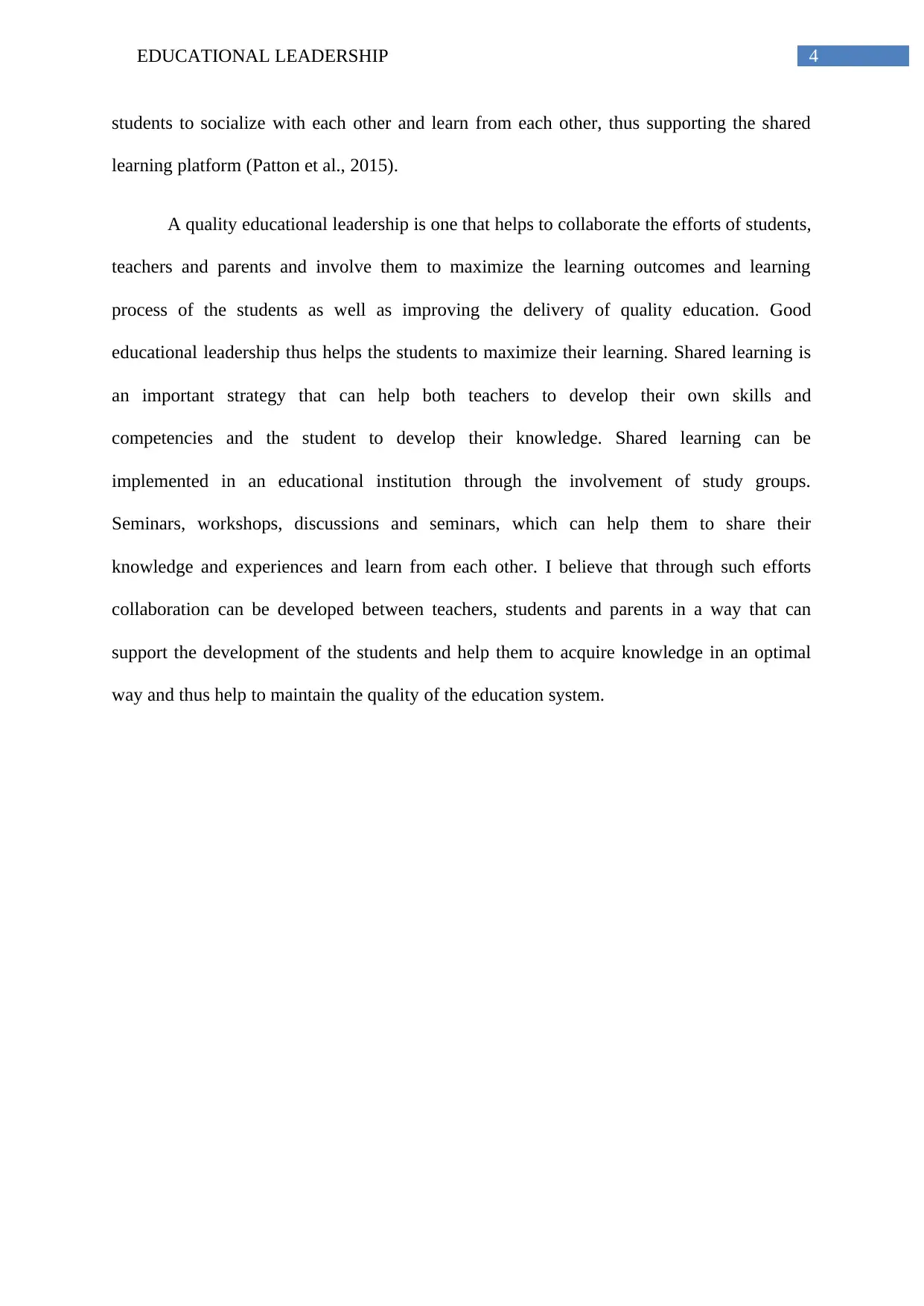
4EDUCATIONAL LEADERSHIP
students to socialize with each other and learn from each other, thus supporting the shared
learning platform (Patton et al., 2015).
A quality educational leadership is one that helps to collaborate the efforts of students,
teachers and parents and involve them to maximize the learning outcomes and learning
process of the students as well as improving the delivery of quality education. Good
educational leadership thus helps the students to maximize their learning. Shared learning is
an important strategy that can help both teachers to develop their own skills and
competencies and the student to develop their knowledge. Shared learning can be
implemented in an educational institution through the involvement of study groups.
Seminars, workshops, discussions and seminars, which can help them to share their
knowledge and experiences and learn from each other. I believe that through such efforts
collaboration can be developed between teachers, students and parents in a way that can
support the development of the students and help them to acquire knowledge in an optimal
way and thus help to maintain the quality of the education system.
students to socialize with each other and learn from each other, thus supporting the shared
learning platform (Patton et al., 2015).
A quality educational leadership is one that helps to collaborate the efforts of students,
teachers and parents and involve them to maximize the learning outcomes and learning
process of the students as well as improving the delivery of quality education. Good
educational leadership thus helps the students to maximize their learning. Shared learning is
an important strategy that can help both teachers to develop their own skills and
competencies and the student to develop their knowledge. Shared learning can be
implemented in an educational institution through the involvement of study groups.
Seminars, workshops, discussions and seminars, which can help them to share their
knowledge and experiences and learn from each other. I believe that through such efforts
collaboration can be developed between teachers, students and parents in a way that can
support the development of the students and help them to acquire knowledge in an optimal
way and thus help to maintain the quality of the education system.
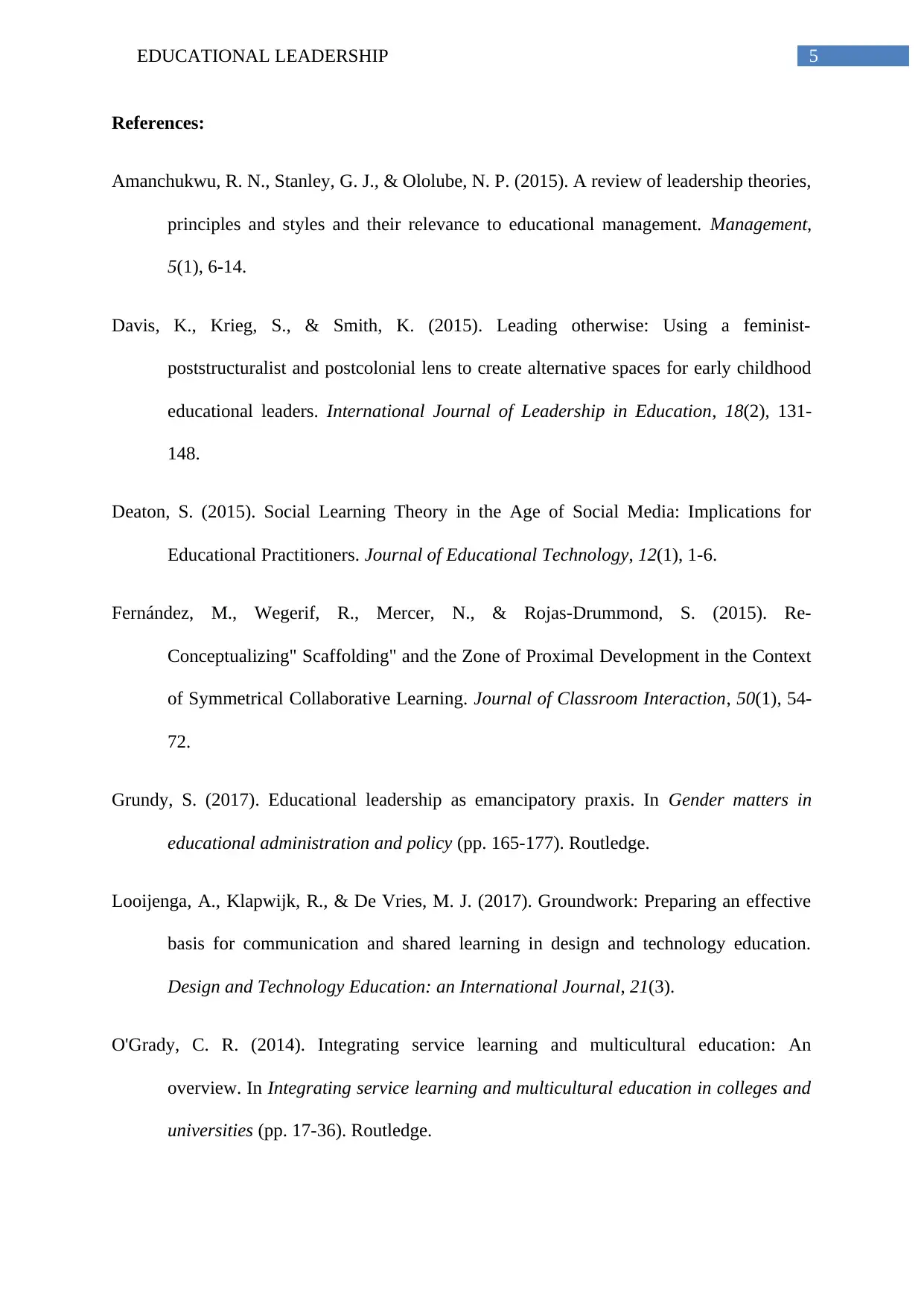
5EDUCATIONAL LEADERSHIP
References:
Amanchukwu, R. N., Stanley, G. J., & Ololube, N. P. (2015). A review of leadership theories,
principles and styles and their relevance to educational management. Management,
5(1), 6-14.
Davis, K., Krieg, S., & Smith, K. (2015). Leading otherwise: Using a feminist-
poststructuralist and postcolonial lens to create alternative spaces for early childhood
educational leaders. International Journal of Leadership in Education, 18(2), 131-
148.
Deaton, S. (2015). Social Learning Theory in the Age of Social Media: Implications for
Educational Practitioners. Journal of Educational Technology, 12(1), 1-6.
Fernández, M., Wegerif, R., Mercer, N., & Rojas-Drummond, S. (2015). Re-
Conceptualizing" Scaffolding" and the Zone of Proximal Development in the Context
of Symmetrical Collaborative Learning. Journal of Classroom Interaction, 50(1), 54-
72.
Grundy, S. (2017). Educational leadership as emancipatory praxis. In Gender matters in
educational administration and policy (pp. 165-177). Routledge.
Looijenga, A., Klapwijk, R., & De Vries, M. J. (2017). Groundwork: Preparing an effective
basis for communication and shared learning in design and technology education.
Design and Technology Education: an International Journal, 21(3).
O'Grady, C. R. (2014). Integrating service learning and multicultural education: An
overview. In Integrating service learning and multicultural education in colleges and
universities (pp. 17-36). Routledge.
References:
Amanchukwu, R. N., Stanley, G. J., & Ololube, N. P. (2015). A review of leadership theories,
principles and styles and their relevance to educational management. Management,
5(1), 6-14.
Davis, K., Krieg, S., & Smith, K. (2015). Leading otherwise: Using a feminist-
poststructuralist and postcolonial lens to create alternative spaces for early childhood
educational leaders. International Journal of Leadership in Education, 18(2), 131-
148.
Deaton, S. (2015). Social Learning Theory in the Age of Social Media: Implications for
Educational Practitioners. Journal of Educational Technology, 12(1), 1-6.
Fernández, M., Wegerif, R., Mercer, N., & Rojas-Drummond, S. (2015). Re-
Conceptualizing" Scaffolding" and the Zone of Proximal Development in the Context
of Symmetrical Collaborative Learning. Journal of Classroom Interaction, 50(1), 54-
72.
Grundy, S. (2017). Educational leadership as emancipatory praxis. In Gender matters in
educational administration and policy (pp. 165-177). Routledge.
Looijenga, A., Klapwijk, R., & De Vries, M. J. (2017). Groundwork: Preparing an effective
basis for communication and shared learning in design and technology education.
Design and Technology Education: an International Journal, 21(3).
O'Grady, C. R. (2014). Integrating service learning and multicultural education: An
overview. In Integrating service learning and multicultural education in colleges and
universities (pp. 17-36). Routledge.
⊘ This is a preview!⊘
Do you want full access?
Subscribe today to unlock all pages.

Trusted by 1+ million students worldwide
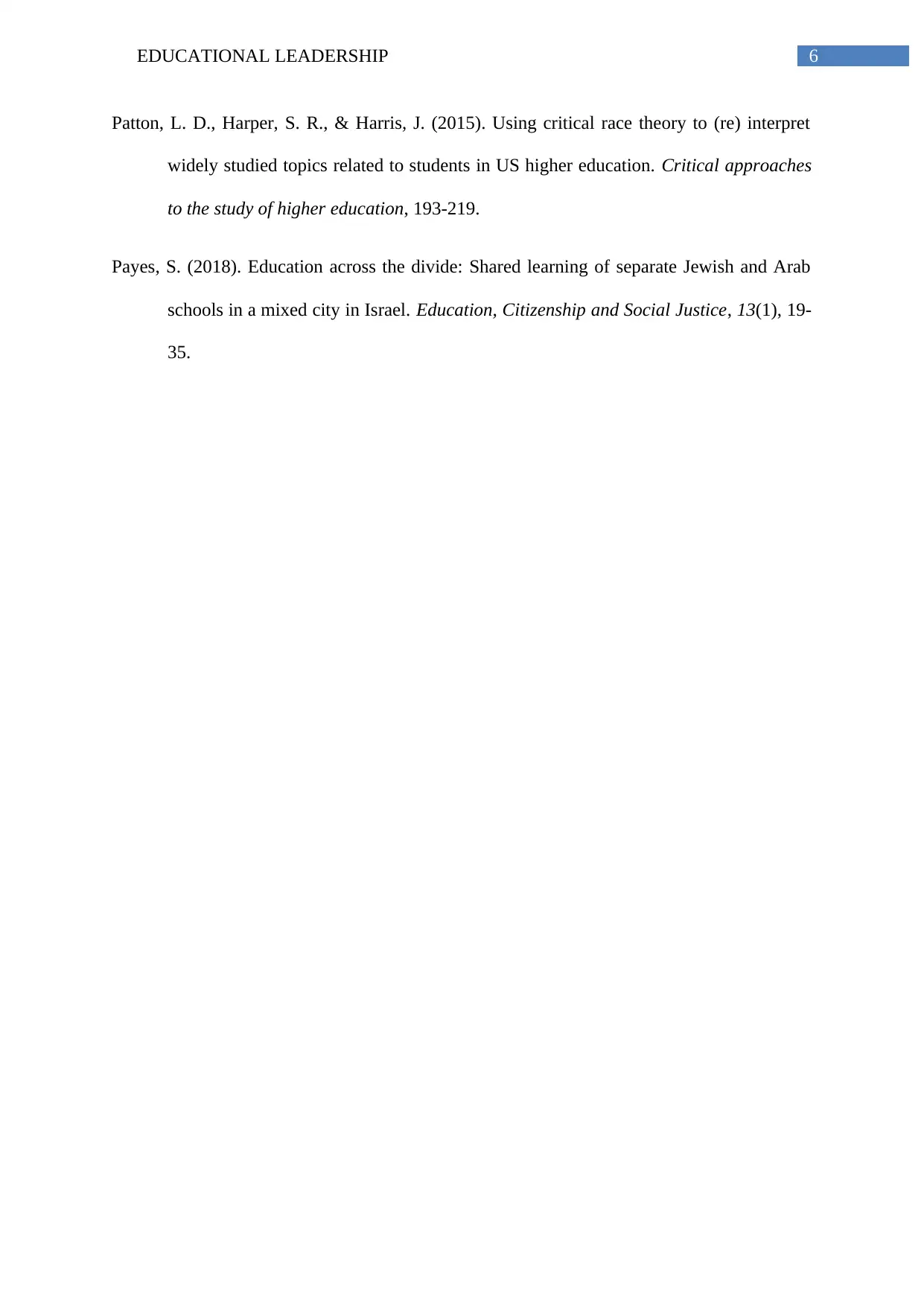
6EDUCATIONAL LEADERSHIP
Patton, L. D., Harper, S. R., & Harris, J. (2015). Using critical race theory to (re) interpret
widely studied topics related to students in US higher education. Critical approaches
to the study of higher education, 193-219.
Payes, S. (2018). Education across the divide: Shared learning of separate Jewish and Arab
schools in a mixed city in Israel. Education, Citizenship and Social Justice, 13(1), 19-
35.
Patton, L. D., Harper, S. R., & Harris, J. (2015). Using critical race theory to (re) interpret
widely studied topics related to students in US higher education. Critical approaches
to the study of higher education, 193-219.
Payes, S. (2018). Education across the divide: Shared learning of separate Jewish and Arab
schools in a mixed city in Israel. Education, Citizenship and Social Justice, 13(1), 19-
35.
1 out of 7
Related Documents
Your All-in-One AI-Powered Toolkit for Academic Success.
+13062052269
info@desklib.com
Available 24*7 on WhatsApp / Email
![[object Object]](/_next/static/media/star-bottom.7253800d.svg)
Unlock your academic potential
Copyright © 2020–2026 A2Z Services. All Rights Reserved. Developed and managed by ZUCOL.





